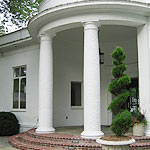ABOUT THE CENTER

Harvard University’s Center for Hellenic Studies, located in Washington DC, was founded by means of an endowment made “exclusively for the establishment of an educational center in the field of Hellenic Studies designed to rediscover the humanism of the Hellenic Greeks.” This humanistic vision remains the driving force of the Center for Hellenic Studies.
A fitting metaphor for the mission of the Center (and the basis of our logo) is the lighthouse of Alexandria, the Pharos, as envisioned in the dream of Alexander the Great. The story of this vision, as retold in Plutarch’s Life of Alexander, was meant to become a permanent “charter myth” that captured the ideal of Alexandria-in-Egypt as the ultimate Greek city and – more basically – the ideal of Hellenic Civilization as a universalized concept of humanism, transcending distinctions between Europe and non-Europe.
The Center tries to honor these ideals by bringing together a variety of research and teaching interests centering on Hellenic civilization in the widest sense of the term “Hellenic.” This concept encompasses the evolution of the Greek language and its culture as a central point of contact for all the different civilizations of the ancient Mediterranean world. Interaction with foreign cultures, including the diffusion of Roman influence, is an integral part of this concept.
The Director of the Center is Gregory Nagy, who is concurrently the Francis Jones Professor of Classical Greek Literature at the Harvard campus in Cambridge. He is resident at the Center in Washington, where Current Fellows, elected annually, pursue research in one of the world’s premier research libraries. Conferences and programs are a regular part of the educational mission of the Center. New initiatives, such as the Virtual Center, will expand this mission far beyond the Center’s campus in Washington.
These initiatives include Web-based publications in conjunction with the Stoa Consortium; various on-line teaching, research, and discussion projects; an interactive multitext of Homer (modeled on the editorial research of the ancient Alexandrian scholars); and full-text online books.
